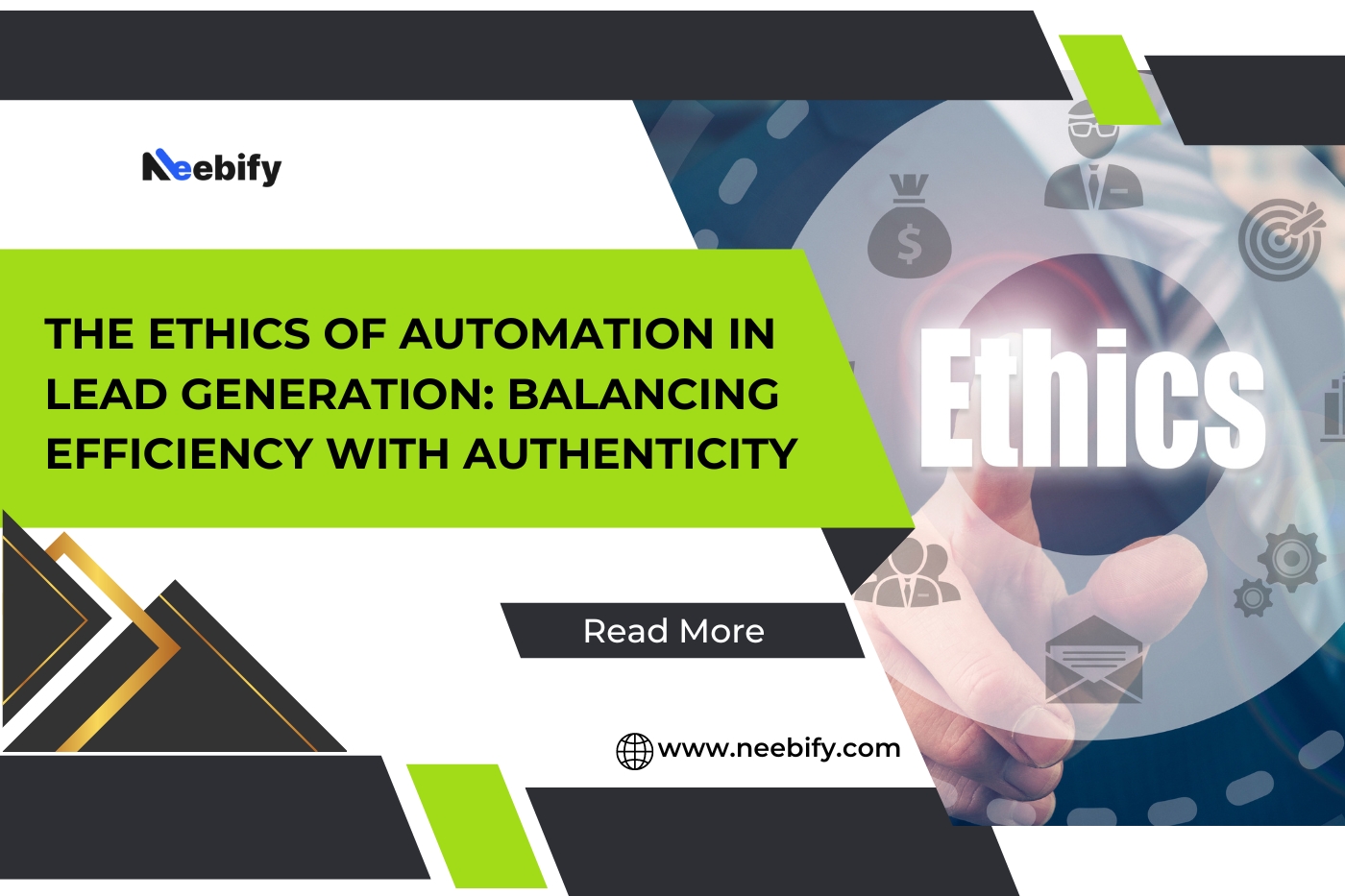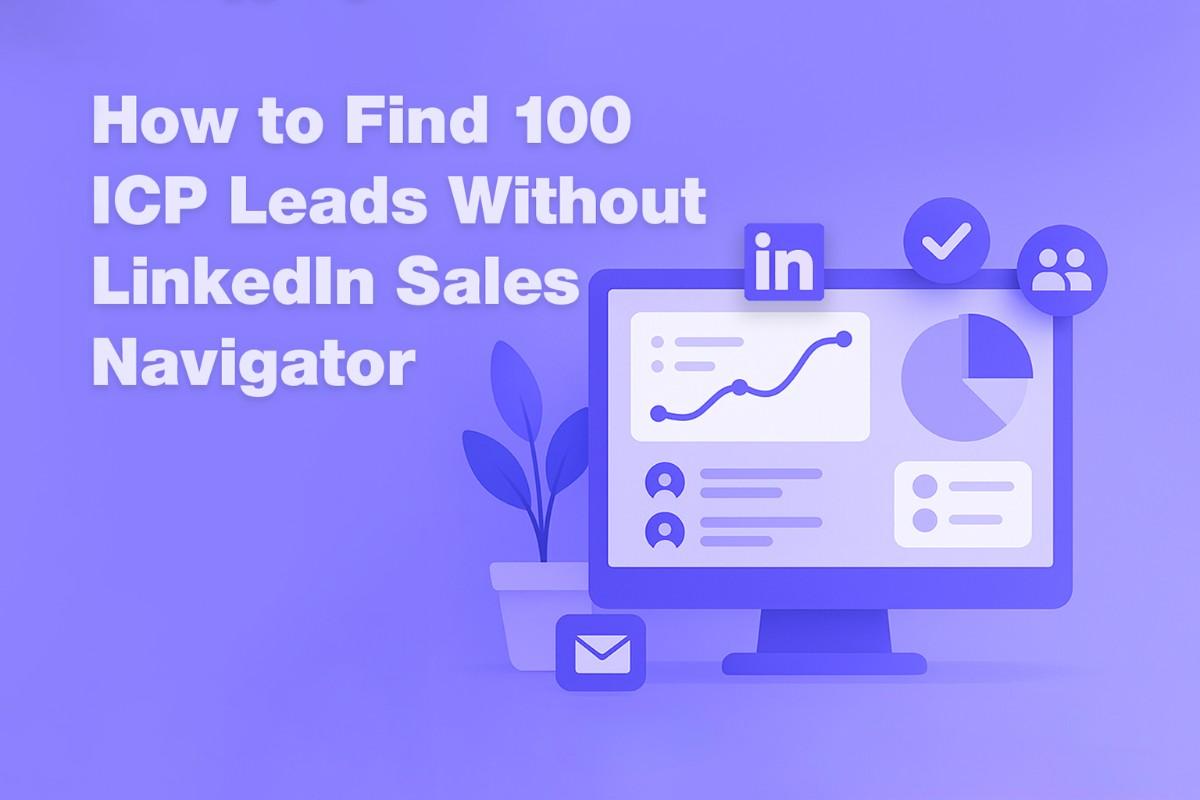Table of content
The Ethics of Automation in Lead Generation: Balancing Efficiency with Authenticity
Automation in lead generation has totally revamped how businesses function in terms of attracting, engaging, and converting prospects in the digital age. With advanced technologies like AI, machine learning, and workflow automation, companies can process large volumes of data, personalize their outreach, and accelerate their sales cycles. The misuse of this new-found power compels the adoption of proper responsibility in using these tools effectively. It is a balance between efficiency and authenticity, not only in maintaining an image but in building trust with the audience. This guide covers some of the ethical considerations about automation in lead generation and goes deeper into how to maintain authenticity through the leverage of technology.
1. Understand Automation's Role in Lead Generation
Automation in lead generation is ensuring the automation of routine and repetitive activities, including those associated with data harvesting, email marketing, activity at social sites, and management of customer relationships. This smooths the way business reaches out for potential customers, catches them at the right times, and engages them with their product for better conversion rates.
Benefits of Automation:
Smarter Efficiency: Automation makes the more manual tasks, which take a lot of time, move faster to get them out of the way so that businesses can then focus on strategy and building relationships.
Scalability: Automated systems are able to handle a large volume of information and customer interaction, making it easier to scale marketing efforts.
Improved Targeting: Data-driven automation tools help in segmenting their audience and deliver personalized content for a better customer experience.
While these are undeniable benefits, ethics regarding the use of automation are crucial in order not to fall prey to probable pitfalls that can ruin a company's reputation and disintegrate customer trust.
2. Ethical Challenges of Automation in Lead Generation
Privacy Concerns
The major ethical issues in automated lead generation are related to privacy. Collection, storage, and processing of personal data by automated systems could lead to leakage of sensitive information on account of negligence. This calls for transparency in the part of businesses about data collection practices and strict adherence to regulations like GDPR (General Data Protection regulation)and CCPA(California Consumer Privacy Act of 2018).
Over-automation and Loss of Human Touch
While automation might streamline processes and make things easier, too much reliance on automation may kill the personal touch, which is often quite important in building relationships. Automated responses and interactions tend to be impersonal; therefore, prospects may disconnect from them. For that reason, a balance between automated processes and human interaction must be achieved to uphold authenticity.
Manipulative Practices
Automation tools can be used to manipulate potential customers in wrongful ways, such as through artificial personalization or even misleading messaging. This can erode trust and damage a brand's reputation. Ethical lead generation needs to hold genuine connections higher than manipulative tactics.
3. Balancing Efficiency with Authenticity
Balancing efficiency with authenticity in automated lead generation requires a business to be all about the customer. Ways this may be achieved are:
1. Transparency in Prioritization
Fundamentally, ethical lead generation insists on sheer transparency in collecting and using data. A business enterprise should, in the first place, explain to the customer how their data was collected, used, and protected. It has to show an "Opt-out" option and respect the user's preference-this respects user privacy and gains customer trust.
2. Humanize Automated Interactions
Sometimes, automated messages tend to sound cold and impersonal. For personalization, include the client's name, content about them, and messaging germane to the context. Offering clear avenues for human support at key points may also help improve customer experience.
3. Avoid Overly Automated Functions
Not every interaction needs or deserves automation. Complex queries, complaints, and sensitive issues are better dealt with by human representatives themselves. This model of hybrid automation of routine queries while reverting to human interaction in case of more complex situations makes each customer feel important and heard.
4. Ethics in the Use of Data
It is crucial that businesses collect only data that is essential and ensure the same is put into ethical use. Companies should not invent obtrusive ways of gathering data, let alone in the absence of consent by customers. Ethical use of data also involves measures that protect customer data from breach and unauthorized access.
5. Forge Real Engagements
Automate to make engagement easier, not to remove your personal touch. Drive the best experience through best content, fantastic interactions, and timeliness. Instead of letting automated emails mark the end, drive real engagement for leads through live webinars, Q&A, or personalized video messages.
6. Monitor and Adjust
Regular audits of automated processes should be performed in order to ensure that they are in line with your brand values and ethical expectations. Monitoring KPIs and customer feedback should be able to point out areas where automation is falling short in delivering authentic customer experiences.
4. Real-World Examples of Ethical Automation in Lead Generation
Case Study 1: Ethical Email Marketing Automation
More specifically, a B2B software enterprise would turn to email marketing automation, perhaps toward lead nurturing. Based on user behavior and preferences, he sends out segmented, personalized content in place of bombarding prospects with generic messages. They maintain transparency by having very clear 'unsubscribe' options and respect data privacy by users, thus gaining more engagement and trust.
Case Study 2: Human Touch Chatbots
An e-commerce company employs chatbots on its website, integrated by a software partner, to answer routine inquiries and even make product recommendations. The fact is, this chatbot has been programmed to automatically divert conversations to a human agent if it senses the query is more complex than it can handle. In this way, the business covers the efficiency without losing the human touch and enhances customer satisfaction.
Case Study 3: CRM Integration for Personalized Outreach
A marketing agency uses CRM automation tools to maintain rich records of client interactions and preferences. Using that data, it modifies its own outreach efforts to customize every prospect's unique needs and interests. With its automated system, opportunities for human follow-up are flagged so it can get the right balance between automation and personal interaction.
5. The Future of Ethical Automation in Lead Generation
As technology progresses, so too will all forms of automation in terms of reach and power, but at its very heart, the balancing of efficiency with a personal touch will wield the most potent force. Future trends in ethical automation will be pinpointed as the following:
1. Better AI ethics
Since AI will continue taking a role much greater in automation, ethical AI development must uphold a higher profile. Chief among these is the work on bias avoidance in algorithms, the primary ingredient in achieving transparent decisions for AI and the accountability of the actions of AI.
2. More Emphasis on Consent
Increased strength of privacy regulations means that explicit consent will become the norm for data collection and usage. Firms will have to get creative in eliciting the consent they need without hurting the user experience in the process.
3. AI-Driven Personalized Experiences
AI will further allow more personalized interaction, making the delivery of the most relevant content and support possible in real time. It will be the business's job to make sure the communication remains ethical and respectful of user preferences.
4. Automation with Empathy
Future automation tools probably will have an element of empathy in them, allowing for an interaction that is slightly more thoughtful about the state and context of the user. This will be an approach that maintains authenticity and creates a better connection with leads.
Conclusion
Automation in lead generation does indeed provide helpful efficiency, scalability, and targeting capabilities. One always needs to bear in mind ethical considerations while deriving these benefits, so that automation does not lead toward manipulative activities, hence offering a fake presentation or work against the trust of a client. That way, companies get the very best from automation without tearing substantive relationships apart with the group they serve, meaning that humanizing experience, avoiding over-automation, and doing things ethically through data will be in place. All this stands by ethical practices that need to be kept intact to be successful and sustainable when technology will continue to evolve.
Get your next meeting in a
matter of minutes.
Free Trial
Latest
The Ultimate LinkedIn Outreach Playbook 2025
A practical, modern guide to mastering LinkedIn outreach in 2025 — learn how to boost reply rates, p
12/1/2025How to Find 100 ICP Leads Without LinkedIn Sales Navigator
Generating 100 targeted ICP leads doesn’t require LinkedIn Sales Navigator. Learn how to leverage fr
11/28/2025


